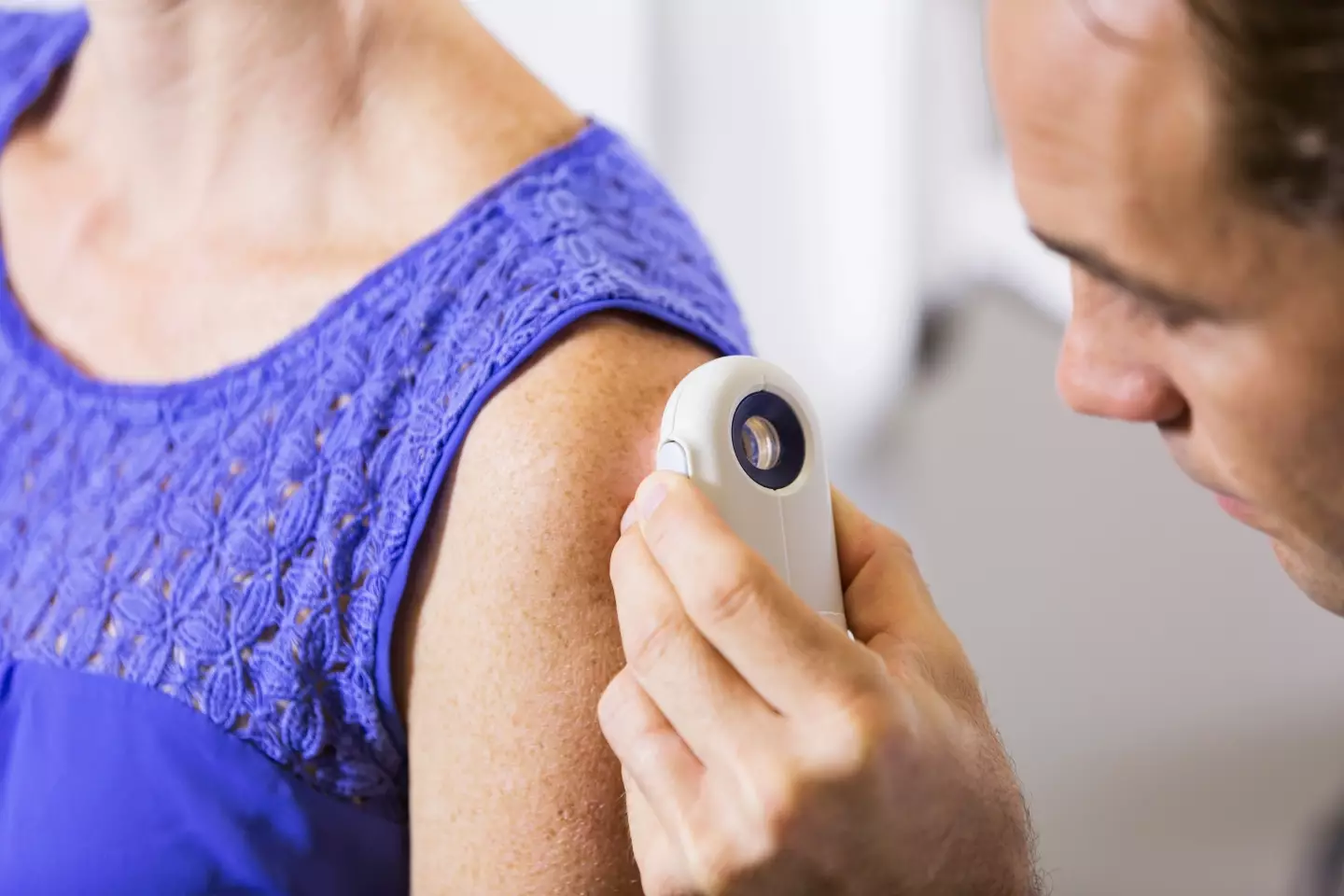A health expert has issued a warning regarding a common cancer symptom many people often ignore during the hot weather.
With the official start of the summer season coming later this month, temperatures across the US are set to sharply increase.
And while it’s all well and good enjoying the sunshine during the daytime, sleeping at night can be a bit of a nightmare due to humid conditions.
Night sweats can become a common occurrence due to the hot weather, but one doctor has warned frequent night sweats could be a sign of a serious underlying condition.
Dr Suhail Hussain has said they may be a sign of leukaemia or lymphoma, two cancers that affect blood cells.


A doctor has issued a warning (Getty Stock Photo)
While leukaemia is primarily a cancer of the bone marrow, lymphoma affects the lymphatic system.
Dr Hussain told the Express: “Night sweats are a common phenomenon and one that’s far more likely to occur on hot, sticky nights.
“But persistent or unexplained sweating during sleep shouldn’t be ignored—particularly if it happens alongside other symptoms like weight loss or fatigue.
“The occurrence of such symptoms should not merely be dismissed as ‘oh well it’s just hot outside’.”
The GP added: “Night sweats can be a sign of something more serious, such as a serious infection, the menopause—or even cancer.
“Sweats associated with cancer are normally drenching—literally. You can wake up with your pyjamas and bed sheets wringing wet with sweat.”
If you’re suffering from extreme night sweats regularly, then you should be paying your GP a visit, Dr Hussain explained.


Night sweats could be a sign of something more sinister (Getty Stock Photo)
The health expert added: “Other rare cancers can also cause sweating. A group of cancers known as carcinoids affect hormonal function vie the neuroendocrine system, and hence may result in excess sweating.
“The bottom line is that if you feel like sweaty Betty or perspiring Pete and it’s going on a bit too long, then head over to your GP and get it checked out.”
Leukaemia Care has a ton of handy bits of information on its website regarding night sweats and how it could be a sign of cancer.
They explained that it’s important to book a doctor’s appointment if ‘you regularly have night sweats that wake you up at night’. On top of that, you want to pay a health care professional a visit if you ‘wake up drenched in sweat, unable to cool down, even if your room is cool’.
Featured Image Credit: Getty Stock Images


A prostate cancer specialist is raising awareness of seven key symptoms to keep an eye out for amid Joe Biden being diagnosed with an ‘aggressive’ form of the disease.
The former president of the United States‘ personal office released a statement yesterday (May 18) revealing he’s been diagnosed with prostate cancer ‘characterized by a Gleason score of 9 (Grade Group 5) with metastasis to the bone’.
“While this represents a more aggressive form of the disease, the cancer appears to be hormone-sensitive which allows for effective management,” the statement noted. “The President and his family are reviewing treatment options with his physicians.”
And now, a urological surgeon has since weighed in, raising awareness of some of the main symptoms of prostate cancer which might’ve otherwise been easily dismissed.
Consultant Urological Surgeon at Cromwell Hospital, Professor Hashim Ahmed, told Metro there are seven signs to look out for – six out of seven all to do with when it comes to going for a wee.


Joe Biden has been diagnosed with prostate cancer (Bruce Glikas/WireImage)
Needing to urinate more often
If you’ve found yourself feeling the urge to wee more often, this could be something to keep an eye on.
You could end up having to nip to the loo more often during the day or this could be particularly highlighted if you find yourself waking up in the night to go to the loo.
This urge to wee more could also be a sign you’re not able to fully empty your bladder.
Your bladder never feeling truly empty
If you always feel like you have something in your bladder, it could mean something is blocking the urine flowing through and there is resultantly residual urine left bobbing about.
And symptoms such as how easily you can start and stop urinating are also worth looking out for too.


Are you going to the loo more frequently? (Getty Stock Images)
Difficulty starting urinating
If you’re getting to the loo but finding it hard to actually get the urine flowing so to speak, this could be a potential sign of potential trouble.
Urine can struggle to flow through to the urethra and out if something like an enlarged prostate or tumor is blocking its way.
On the other hand, having difficulty stopping the flow is also something to take note of.
Difficulty stopping
If you find it difficult to stop your flow or even find a little dribble or leak occurs after, it may be time to check in – and no, we don’t mean reaching for your phone to Google your symptoms, but booking in to raise any concerns with a doctor.
And your overall flow of urine can say something about your health too.
Overall pace to flow of urine
If your urine has as weak flow, it could mean something is pressing on your urethra. And the next sign is a pretty important one to keep track of.


If worried, always consult a doctor (Getty Stock Images)
Blood in urine or semen
Spotting blood in your urine or semen can be an early-stage sign of prostate cancer, so no matter if you spotted it just once or multiple times, it’s important to check it out with a doctor.
And the next symptom can rear it’s head particularly during sex.
Erectile dysfunction
If you find yourself struggling to get or maintain an erection or find it painful to ejaculate, alongside ejaculating less semen then you normally would, keep a note and share your findings with a doctor.
Other symptoms listed by Mayo Clinic include blood in the semen, back pain, bone pain, feeling very tired, losing weight ‘without trying’ and ‘weakness in the arms or legs’.
Professor Ahmed reassured many of these symptoms are ‘temporary’ and can also be ’caused by other problems’ but echoed it’s best to go to a doctor to share your concerns if worried.
If you’ve been affected by any of these issues and want to speak to someone in confidence, contact the American Cancer Society on 1-800-227-2345 or via their live chat feature, available 24/7 every day of the year.
Featured Image Credit: Kevin Dietsch/Getty Images


A new study has found a classic party combo could well raise your risk of developing colon cancer.
While many still assume cancer only impacts the older generation, there’s no doubt the disease is also providing deadly consequences for the younger individuals.
Cancer has been on the rise in younger people for the past few years, and much research is going into uncovering why this worrying trend is happening.
Colorectal cancer is the second leading cause of cancer-related deaths in America, with 153,020 being diagnosed with the disease in 2023 and over 52,000 people losing their lives, according to experts.
Well, new research has found that both alcohol and cigarettes, a common pairing at parties, may increase your risk of developing colon cancer.


The study has provided some interesting results (Getty Stock Photo)
Researchers from Germany found 100 cigarettes in a person’s lifetime can increase the risk of developing colon cancer by 59 per cent compared to those who don’t smoke.
On top of that, the researchers found drinking alcohol every single day, even if it’s just one or two drinks, raises your risk of developing early-onset colon cancer by 39 per cent compared to those who don’t drink.
“Alcohol consumption and smoking are significant risk factors for EOCRC and should be addressed in the context of prevention,” the researchers wrote.
“These results clearly suggest that alcohol consumption is associated with a significantly increased risk of CRC at any age.
“The results on smoking showed a significant association of smoking with EOCRC, while former smoking was not associated with EOCRC.”
Bowel Cancer UK have provided advice when it comes to alcohol and smoking and how you can reduce your risk.


Alcohol and smoking can increase your risk of developing colon cancer (Getty Stock Photo)
They state: “Alcohol is linked to an increased risk of developing several types of cancer, including bowel cancer. Alcohol can damage the cells that line the inside of the bowel, which makes it more likely for cancer to develop.
“To reduce the risk of cancer, it’s best to not drink alcohol.
“If you do drink alcohol, cutting down the amount you drink will reduce your risk. It’s recommended that people drink no more than 14 units of alcohol a week and spread it out over the week. Aim to have at least two days without alcohol each week.”
Meanwhile, they also touched on how smoking cigarettes can increase your risk of developing colon cancer, as they said: “Smoking increases your risk of developing several cancers, including bowel cancer. People who smoke are more likely to develop polyps (non-cancerous growths) in the bowel which could turn into cancer if they’re not treated.”
Featured Image Credit: Getty Images/Flashpop
Topics: Health, Cancer, Colon cancer, Alcohol


A doctor has urged people to ‘never ignore’ this one cold symptom if it sticks around for a certain period of time.
While a runny nose, sneezing and coughing are perfectly common symptoms of a cold (especially during the winter months), it’s never a good sign if they hang about.
And there is one particular aspect you shouldn’t be ignoring if you’ve had it for three weeks or more, according to Dr Shireen.
The healthcare professional, who shares her words of wisdom on TikTok to over 24,000 followers, has advised when you should book an appointment with your GP.


Colds are common at this time of year (Getty Stock Image)
“There is one thing I wish everyone knew about coughs – and it’s really simple. If you’ve had a persistent cough for more than three weeks, you need to see a doctor,” Dr Shireen said.
“There are lots of different things that can cause a chronic cough like asthma, reflux, respiratory tract infection. But, it is also important that we rule out things like lung cancer.”
The doctor added: “If someone has a persistent cough, what we [as doctors] usually do is first examine them and send them for a chest X-ray. It’s a really quick, easy test that we can do to look at someone’s lungs and make sure nothing is going on there that we need to be concerned about.”
While a cough is common once in a while, Mayo Clinic warns a cough ‘that lasts for several weeks or one that brings up discolored or bloody mucus may be a sign of a condition that needs medical attention’.
The NHS also recommends those who have a cough alongside losing weight for no reason and those who have a weakened immune system because of chemotherapy or diabetes, for example, should pay their GP a visit.


According to the GP, you should be paying the doctors a visit if you’ve had a ‘persistent cough’ for three weeks (Getty Stock Image)
Previously, Dr Malathy Munisamy told The Mirror that ‘standard coughs’ will typically ‘settle on their own within a couple of weeks’ and are ‘often harmless’.
And if your cough is caused by a cold or flu – with typical symptoms taking the form of sneezing, headaches, muscle aches and fever – then ‘rest, hydration, paracetamol, ibuprofen, or cold relief medication are usually effective treatments’.
However, Cleveland Clinic reassures: “Having a cough often means nothing serious. It’s normal (and helpful) to cough in certain situations. Coughing helps you get rid of things in your throat and airways that are irritating or making it harder to breathe.
“If you also have other symptoms like trouble breathing, fever, trouble eating or sleeping, or you’re coughing up bloody or colored sputum, call your healthcare provider for advice. Because young kids can’t tell us what they’re feeling, it’s a good idea to call your child’s provider if they have a cough and fever or a cough that sounds uncomfortable or concerning to you.”
Featured Image Credit: Getty Images/Paul Bradbury


A doctor has detailed one key symptom that led him to self-diagnose his own cancer.
Dr Muneeb Shah was just 31 years old when he was diagnosed with a common form of skin cancer in 2021.
The doctor and dermatologist shares his health advice to over 18 million followers on TikTok with short videos on the most discussed issues.
Dr Shah had some health issues of his own recently after being diagnosed with basal cell skin cancer – something he was able to self-diagnose.
The health expert spoke to Refinery29 about when he knew something wasn’t quite right.
It was in fact when Dr Shah was completing his dermatology training that he noticed a spot on his chest, and during this stage of his career, the doctor was learning how to spot skin cancer on patients.


The doctor was diagnosed with skin cancer (TikTok/@dermdoctor)
Well, it just so happened to be the doctor was displaying a common symptom of the disease.
“It didn’t look scary – it was simply a pink, itchy bump that could be mistaken for a pimple or an ingrown hair,” he said.
“I kept an eye on it, and one day when I happened to scratch it, the surface came off easily and it started to bleed.”
He continued: “I tried to look at it with my phone and my dermatoscope, a tool that helps to magnify the blood vessels within the lesion. That’s when I started to think, maybe this is skin cancer.”
Dr Shah had it examined via a biopsy two months after he first spotted it on his chest, with the health professional having his assumptions on what it may have been.
“My top suspicion was that this was going to be a basal cell skin cancer or squamous cell skin cancer,” he explained.


The doctor had a common skin cancer symptom (Getty Stock Photo)
“I tend to give counselling to the patient before I know the diagnosis, so I was doing that to myself in a way. It took three days for the results to come back and it was as I had suspected: a basal cell skin cancer.”
After his diagnosis, Dr Shah opted for Mohs surgery, which is described as a ‘controlled surgery’ to removed skin cancer.
“I wanted Mohs surgery so that it was completely gone, because I knew the worst case scenario,” he said.
Now post-op, Dr Shah is encouraging folks to get themselves checked if something doesn’t look or feel right.
“For men, the most common site for skin cancer is the back and for women it’s the legs. These areas are more challenging to see, so it’s always important to check your body,” he added.



